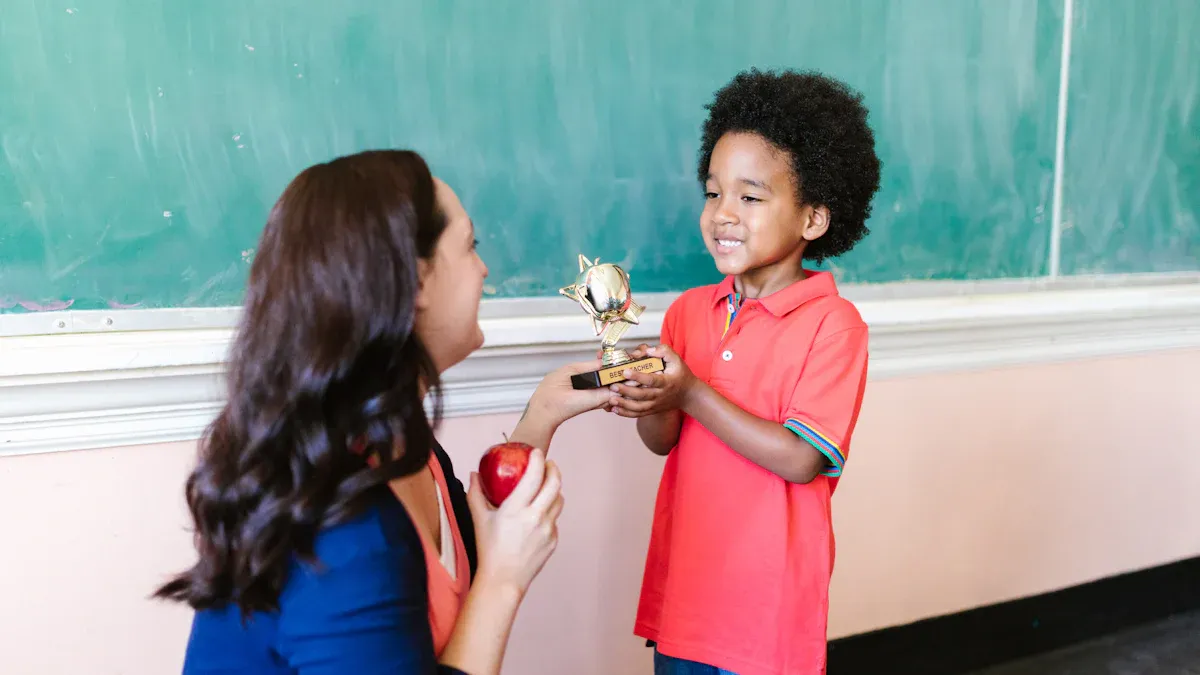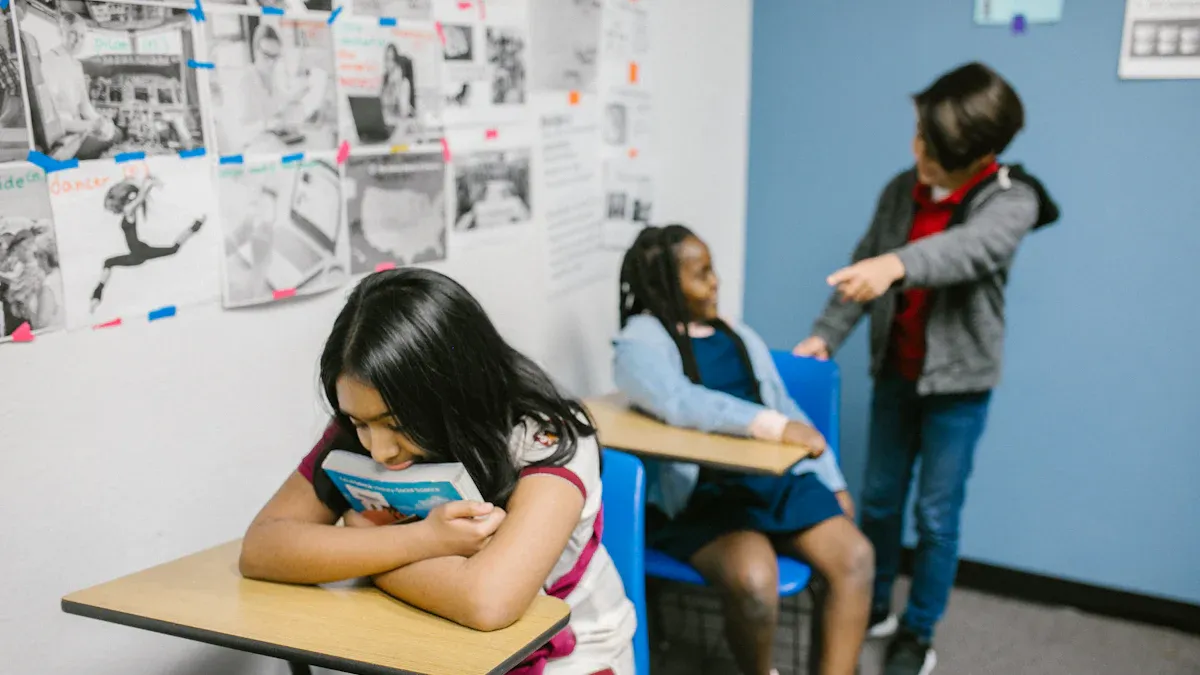
It’s Friday afternoon. You reach for the prize box, filled with stickers and candy. Studies show these rewards boost participation and homework, but you still wonder—do they truly make students feel seen? You deserve a tool that uplifts hearts. Imagine giving a pocket hug that reminds a child of their worth.
Key Takeaways
Old rewards like stickers and candy can lower students' drive and self-worth as time goes on. - Pocket hugs are tiny, special cards that help students feel confident and remind them they matter and are noticed. - Giving pocket hugs often in class helps grow kindness, support, and strong self-esteem in students.
The Prize Box Is Broken

Briefly detail the downsides of common rewards.
You want your students to feel good and try hard. You give out stickers, candy, or toys to make them happy. But these rewards do not always work well.
They make students care more about prizes than learning.
Some kids feel worried or sad if they do not get a reward.
Students may start to need rewards to feel good about themselves.
They might think only winning matters, not trying or growing.
Kids may stop being kind and just ask, "What do I get?"
At first, giving out toys or candy can make students work harder. But soon, they lose interest. When the rewards stop, they may stop trying. This can hurt their creativity and make them less excited about school. Some kids even feel left out or sad, which can lower their self-esteem and happiness.
The goal isn't just to give a thing, but to give a feeling—the feeling of being recognized and valued.
The real reason for rewards is to make hearts happy, not just hands full.
You want every student to feel noticed and important in your classroom. When you give mental health gifts that help students feel good, you give them more than a quick smile. You help them feel like they belong and can be proud of themselves. Saying something kind or writing a nice note helps students feel good inside. These gifts help students learn to value effort, kindness, and growth. When you pick mental health gifts that focus on wellness, you help every student feel special, cared for, and ready to do their best.
Pocket Hugs "A High-Five You Can Keep"

Lasting Self-Esteem Boost
You want your students to feel proud of who they are. A pocket hug is more than a small card. It is a portable reminder that someone believes in them. When you give a student a pocket hug, you give them a piece of encouragement they can hold all day. Research shows that tangible rewards, like affirmation cards, help students feel more confident and motivated. These mental health gifts work best when you connect them to effort and growth. They help students see their own progress and build trust in self. When a student keeps a pocket hug in their pocket or backpack, they remember that you see their hard work and care about their wellness.
You can use pocket hugs to boost self-esteem in many ways. Give one after a student tries something new. Offer one when a student helps a classmate. Each time, you show that you value their actions, not just their results. This helps students feel competent and proud, which builds lasting self-esteem.
Comfort and Encouragement
Every student faces tough days. Some feel nervous on the first day of school. Others worry before a big test. Mental health gifts like pocket hugs and affirmation cards offer comfort when students need it most. You can write a simple message or add a motivational quote. These words can lift a student’s mood and help them keep going.
Here are some quotes you can use on pocket hugs and affirmation cards:
"You don’t have to be great to start, but you have to start to be great." — Zig Ziglar
"Optimism is a happiness magnet. If you stay positive, good things and good people will be drawn to you." — Mary Lou Retton
"Your positive action combined with positive thinking results in success." — Shiv Khera
"To be an overachiever you have to be an over-believer." — Dabo Swinney
"Optimism is the faith that leads to achievement. Nothing can be done without hope and confidence." — Helen Keller
You can also share stories of real students who found strength in these messages. For example, a student who felt anxious before a test read, "Our greatest weakness lies in giving up. The most certain way to succeed is always to try just one more time." This helped them try again and feel better about themselves. Mental health gifts like these support wellness and help students manage stress. They are also great gifts for anxiety, giving students a tool to calm their minds and focus on their strengths.
Meaningful Gifts for Students
You want your gifts for students to matter. A pocket hug is a meaningful and trust-building gift because it shows you care about their feelings, emotions and growth. Child psychology research says that gifts become more meaningful as children grow and learn to reflect on their experiences. When you give a pocket hug or other mental health gifts, you help students practice kindness and gratitude. These gifts encourage students to think about their own feelings and the feelings of others, which supports wellness and community.
You can make pocket hugs even more special by letting students decorate their own cards or write messages to classmates. This turns a simple card into a powerful tool for building community care. When students share pocket hugs, they learn to support each other and celebrate each other’s strengths. This helps everyone feel like they belong and are valued in your classroom community.
Tip: Use pocket hugs as gifts for anxiety or as part of your wellness routine. Give them out during stressful times, like before tests or at the end of the year. Encourage students to keep them close and read them when they need a boost.
Mental health gifts like pocket hugs and affirmation cards do more than reward good behavior. They help students feel safe, valued, and connected. They build a strong sense of community and wellness that lasts far beyond the classroom.
How to Use Pocket Hugs
Personalizing Messages
You can make each pocket hug feel special. Add a note that talks about what a student does well. Write about something good they did lately. Use bright colors on the cards. Let students decorate their own cards if they want. When you make these self-care gifts personal, you show you notice each student. This helps students trust you and feel seen. A pocket hug with a kind note can remind students you care. It helps them feel better when they need support.
Tip: Have students write nice notes for each other. This spreads kindness and makes your classroom stronger.
Classroom Tips
You can use pocket hugs in your classroom every day. Start the day with a meeting. Let students share how they feel and take a pocket hug if they want. Put a box of mental health gifts in your calm down corner. Students can use them when they feel upset. Give out pocket hugs during hard times, like tests or big changes. These routines help students practice wellness and manage their feelings. Keep the cards in a file box with names and weeks on them. Let students add notes or stamps for good behavior. This keeps your classroom connected and helps everyone build good habits.
Ongoing Support
Wellness grows when you give support often. Make pocket hugs a regular thing, not just a one-time gift. When you use these cards all year, students get more confident and strong. Social and emotional learning programs show that steady support helps students behave better and make friends. Your daily kindness helps every student feel safe and important. As students get this support, they learn to trust themselves and others. This makes your classroom a place where everyone feels good and works together.
Remember: Every small kind act matters. You are making a classroom where everyone belongs.
Pocket hug cards help you build real self-esteem in your students. Emotional support and personal affirmation lower stress and boost confidence. You create a classroom where every child feels valued.
Small acts of kindness spark big changes.
Try pocket hugs and watch your students grow stronger every day.
FAQ
What is a pocket hug card?
A pocket hug card is a small card with a kind message. You can keep it in your pocket. It reminds you that someone cares.
Tip: Read your card when you need a boost!
How do I make pocket hug cards special for my students?
You can write each student’s name and a personal note. Use bright colors or stickers. Let students decorate their own cards for extra fun.
When should I give out pocket hug cards?
You can give pocket hug cards after a student tries hard, helps others, or needs comfort. These cards work well during tests or big changes.